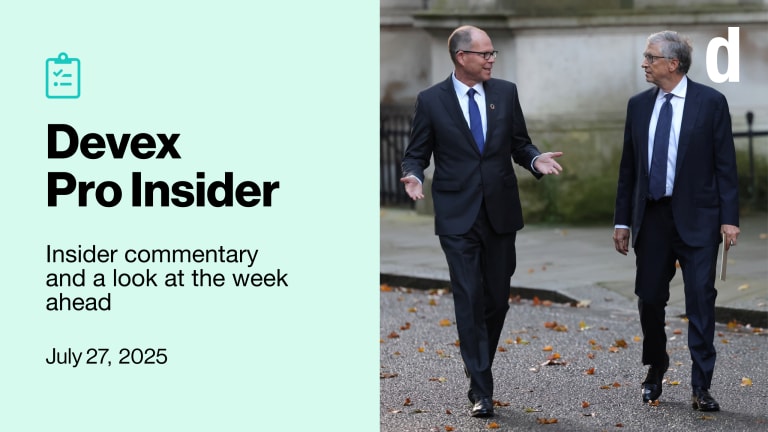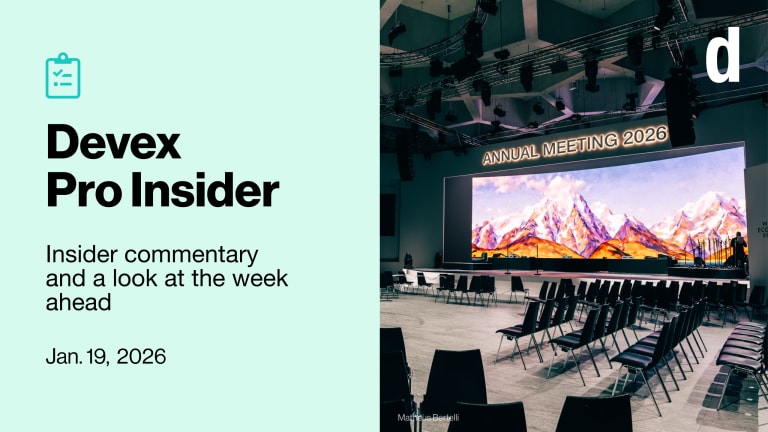
HYDERABAD, India — The future holds far more “gender lens investing” for the Overseas Private Investment Corporation. But to say the United States government's development finance institution has a “renewed focus” on gender wouldn’t be quite accurate, according to Kathryn Kaufman, the agency’s new managing director for global women's initiatives.
“What OPIC does as a development finance institution is reach the places where the market most needs us — and by definition that often means women,” said Kaufman, who joined OPIC in late August. “We have over $1 billion in microfinance, 90 percent of which goes to women, so gender is part of our DNA.”
Still, historically there hasn’t been an outright focus on women at the nearly 50-year-old agency, which mobilizes private capital to help solve development challenges in industries from critical infrastructure to health care and technology, and currently has a $21.5 billion portfolio of loans and guarantees in more than 100 developing countries.
OPIC, USAID praise Trump's commitment to women's entrepreneurship
For an administration that began by threatening the U.S. Agency for International Development’s gender architecture and fueled early rumors of a shutdown of the Overseas Private Investment Corporation, some people in both agencies have far different outlooks less than a year into the Trump administration — especially when it comes to gender.
In an effort to modernize and jumpstart that gender focus, OPIC President Ray Washburne brought Kaufman on board to head up what was originally referred to as a “women’s initiative” at the agency — but the word “initiative” suggests it might have a beginning and an end, and her mandate has grown far larger than that, Kaufman told Devex on the sidelines of the Global Entrepreneurship Summit in Hyderabad.
Now, Kaufman is focused on building an internal task force to help her rewrite policy and change the way OPIC does business to make sure it’s delivering for women.
The former venture capital fund partner got a taste of the task in front of her on her second day, when she reviewed a deal that would soon come through to the investment committee. It can take anywhere from one to 12 years for a deal to come in front of the board, and it is almost always “fully baked” when it does, Kaufman said.
But in this case — a $65 million loan facility to one of the largest banks in Costa Rica — Kaufman still had a few important questions for the loan officers: “I said ‘OK what’s the gender component of this deal?’ And [I was met with] blank stares, they never considered that.”
In the end, they were able to enforce several strong gender policies from the partner bank, Kaufman said, as they determined to allocate 20 percent of the deal toward lending to women entrepreneurs.
Currently, “we have to look at a deal-by-deal basis, and find out ‘what can we do to push the needle on this particular transaction?’” Kaufman said. “But our priority is not having the ‘one-off 20 percent of this loan goes to women,’ our priority is institutionalizing gender equality in these banks.”
How should we measure 'women's economic empowerment'?
The way most development actors measure empowerment doesn't capture the whole picture.
The main pillars of gender lens investing at OPIC rest on access to finance, access to jobs and access to services that provide more economic opportunity for women — and the agency wants to play a role in shaping the criteria that determines what it means to offer a service that intentionally provides more economic opportunity for women.
They’re starting by adapting their own matrix to encourage it. OPIC’s investment officers are motivated and make decisions based on OPIC’s development matrix, which helps it score opportunities depending on indicators such as whether the deal would provide or transfer a new technology, or enter a minority market.
Now, “How are you contributing to gender equality?” will be among the most important questions a loan officer can ask.
“It’s not about adding cost, it’s about asking questions to get the best solutions for half the people who will be riding the train.”
— Kathryn Kaufman, OPIC’s managing director for global women's initiativesIn the meantime, OPIC is already asking questions of private sector partners that they might not have asked before: “If we’re financing a wind farm, we are asking questions to our sponsor companies like how many women are you employing? Are there women in leadership positions?” Kaufman said. if the institution is financing a large infrastructure project such as a metro, meanwhile, their loan officers are now asking questions about whether the platforms are well lit, or whether the gap on the platform is safe for strollers to cross.
“It’s not about adding cost, it’s about asking questions to get the best solutions for half the people who will be riding the train,” Kaufman said.
OPIC hasn’t brought in new talent aside from Kaufman to make these changes, but the gender lead has recruited a task force of existing employees across business lines to create a team of 13 people — OPIC consists of about 250 employees total — willing to dedicate time on top of their current work to the endeavor of making OPIC deals answer for women. The agency will also likely contract experts in gender to conduct trainings with loan officers.
“We’re turning the lens on ourselves as well,” Kaufman said of examining gender parity within OPIC’s walls.
Although OPIC is staffed by about 50 percent women and most of their top leadership positions are also held by females, “it’s not institutionalized,” said Kaufman, who gave her original presentation on gender lens investing to an OPIC board consisting of only one female member.
If the agency is going to require companies they invest in in Guatemala, for example, to have 30 percent female board representation, this should also be reflected within their own organization.
“At OPIC, we believe it’s important to lead by example, which is why we are making internal reforms in tandem with our shift in focus to gender lens investing,” Kaufman said.
OPIC will make an official announcement in March 2018 to share the name of the gender task force, as well as the amount of money that will be attached to their gender investing: “That’s going to be a really big number,” Kaufman said.








